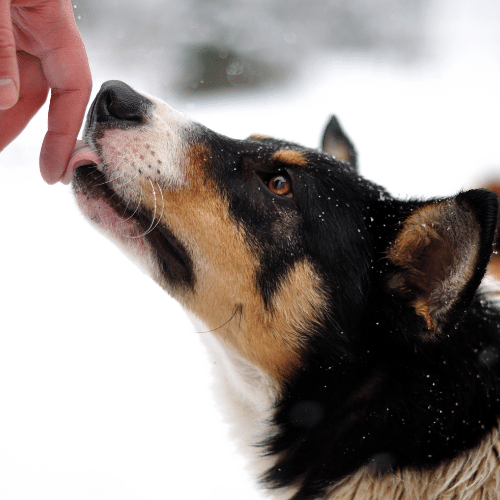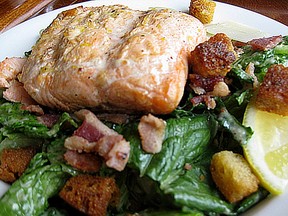Why Do Dogs Lick Their Wounds?
One of the primary reasons dogs lick their wounds is to help soothe the pain and discomfort. Licking the site of the wound overstimulates the brain, which in turn can help temporarily numb the pain. This is similar to humans rubbing or holding their wounds.
Since dogs don’t have hands to rub or hold their wounds, they use the only tool they have for self-soothing—their tongues.
Another reason dogs lick their wounds is to clean away debris and bacteria. Studies have shown that dog saliva has a small amount of bacteria-killing properties. However, the effect is slight and it’s only effective against Escherichia coli and Streptococcus canis.1
So while licking will slightly help decrease these two types of bacteria, there are many other bacteria that can start to overgrow in the wound. Unfortunately, this means that dog saliva ultimately does not help clean or heal the wounds, so it’s best to prevent dogs from licking their wounds.
Will Licking Help To Heal Wounds?
We’ve all heard that a dog’s saliva is antiseptic. Therefore, some people reason that it may be a good idea to allow them to lick your wounds. However, this is typically a bad idea. Especially dogs that are very attached to their owners (such as many herding breeds or Pitbulls) will try to lick wounds that the owner has. However, this does not mean it is a good idea or that you should allow it!
The act of licking is troublesome for a few different reasons. Firstly, while a dog’s saliva does have some antiseptic properties, these are usually minor compared to modern medicine. You’re much better off using an antiseptic cream of some sort. The antiseptic properties of a dog’s saliva are often overblown.
According to one study, a dog’s saliva only withstands the growth of some strains. Others will flourish. For instance, E. Coli has a hard time growing in canine salvia. This is a bacterium that commonly infects newly born puppies, so a dog’s resistance to this bacterium makes perfect sense. However, Staphylococcus is not affected by the antiseptic properties and grows freely.
Interestingly enough, most wound infections on dogs are Staph infections, which are caused by Staphylococcus. It is likely due to the fact that the growth of this bacterium isn’t affected by a dog’s saliva.
Secondly, a dog’s saliva contains a different microbiome than a human’s skin. We all have “good” bacteria in our bodies, including our saliva. Dogs have significantly different bacteria in their saliva than we do on our skin. Therefore, if we allow a dog to lick our wound, we’re introducing bacteria that may potentially be dangerous. The bacteria may not be harmful to our dog, but they will be harmful to us.
Finally, a dog’s tongue is simply not very soft. It can damage wounded tissue and prevent tissue from growing back. It can reopen sores with some ease, which can cause infections to occur. If your wound has already started to heal, new tissue can be destroyed by a dog’s tongue.
Your best bet is to use some sort of antiseptic cream and keep your wound away from your dog. Some dogs seem to have an instinctual need to lick wounds if they are presented. However, this is not recommended in the least. Keep it away from them, using a band-aid or something similar if necessary.

Share this Story: A little licking of the wounds can be beneficial Search ottawacitizen.com

Question: Our dog was bitten on her hip by another dog last week and the damage appeared to be superficial. However, she has since been licking at the bite wounds constantly. We have made an appointment with our vet to have this checked out but are wondering if we should continue to let her lick her wounds? We have been told that licking is beneficial and promotes wound healing. Is this true?
Answer: When a dog licks its wounds, it can indeed be beneficial to the healing process. It has been shown that wound licking not only helps to debride and clean a wound but it can also help speed up the healing process.
In human saliva, enzymes such as lysozymes, cystatins, peroxidases, lactoferrins and defensins, as well as nitrates and an antibody called IgA, are present in the saliva and have antibacterial properties. There is also a compound called a protease inhibitor that is antiviral and antibacterial and, along with growth factors, promotes wound healing. Saliva also contains a painkiller called opiorphon. Research has shown that dog saliva is similar to human saliva in this regard and also contains a number of specific factors that promote wound healing and combat infection.
However, excessive licking can lead to a variety of complications. For example, the mechanical action of licking can delay wound healing if done to excess. Licking a wound is beneficial only if a dog does it sporadically, and too much licking can delay the healing process by preventing a scab from forming. This is why veterinarians will often discourage excessive licking by bandaging wounds or using restraint collars (e.g. Elizabethan collars) on their patients.
Similarly, because a dog licks, bites and chews all manner of things, its mouth and therefore its saliva can be laden with all kinds of bacteria, including some harmful ones. As a result, an infection may be introduced into an open wound if there are pathogenic bacteria present in the mouth. While these bacteria may not be harmful to intact skin, they may cause an infection in an open wound.
It is good that you have booked an appointment to have your dog examined by your veterinarian. Dog bites often appear superficial and yet the hair coat can mask extensive tissue damage below the skin.
Should you let your dog continue to lick her wounds until you see the veterinarian? Probably not because it seems to be doing very little good and maybe even some harm. As pointed out, whether or not it is wise to allow a pet to lick its wounds really depends on each individual and unique circumstance, and when confronted with an open wound, the person best qualified to answer that question is your veterinarian.
Keep your appointment with your veterinarian. By examining the nature and extent of the bite wounds, he or she can tell you what needs to be done (e.g. antibiotics, surgical repair, etc.) and whether or not allowing your dog to lick her wounds will be beneficial.
Dr. Bernhard Pukay is an Ottawa veterinarian. Address letters to Pet Care, Ottawa Citizen, P.O. Box 5020, Ottawa K2C 3M4. Email: [email protected]. Due to the volume of mail, not all letters can be answered. We apologize, but this video has failed to load. Try refreshing your browser, or
Sign up to receive daily headline news from Ottawa Citizen, a division of Postmedia Network Inc. Email Address
By clicking on the sign up button you consent to receive the above newsletter from Postmedia Network Inc. You may unsubscribe any time by clicking on the unsubscribe link at the bottom of our emails or any newsletter. Postmedia Network Inc. | 365 Bloor Street East, Toronto, Ontario, M4W 3L4 | 416-383-2300
A welcome email is on its way. If you dont see it, please check your junk folder.
The next issue of Ottawa Citizen Headline News will soon be in your inbox.
We encountered an issue signing you up. Please try again
Why You Should Not Let Your Dog Lick Their Wounds in 2021
Question: Our dog was bitten on her hip by another dog last week and the damage appeared to be superficial. However, she has since been licking at the bite wounds constantly. We have made an appointment with our vet to have this checked out but are wondering if we should continue to let her lick her wounds? We have been told that licking is beneficial and promotes wound healing. Is this true?
Answer: When a dog licks its wounds, it can indeed be beneficial to the healing process. It has been shown that wound licking not only helps to debride and clean a wound but it can also help speed up the healing process.
In human saliva, enzymes such as lysozymes, cystatins, peroxidases, lactoferrins and defensins, as well as nitrates and an antibody called IgA, are present in the saliva and have antibacterial properties. There is also a compound called a protease inhibitor that is antiviral and antibacterial and, along with growth factors, promotes wound healing. Saliva also contains a painkiller called opiorphon. Research has shown that dog saliva is similar to human saliva in this regard and also contains a number of specific factors that promote wound healing and combat infection.
However, excessive licking can lead to a variety of complications. For example, the mechanical action of licking can delay wound healing if done to excess. Licking a wound is beneficial only if a dog does it sporadically, and too much licking can delay the healing process by preventing a scab from forming. This is why veterinarians will often discourage excessive licking by bandaging wounds or using restraint collars (e.g. Elizabethan collars) on their patients.
Similarly, because a dog licks, bites and chews all manner of things, its mouth and therefore its saliva can be laden with all kinds of bacteria, including some harmful ones. As a result, an infection may be introduced into an open wound if there are pathogenic bacteria present in the mouth. While these bacteria may not be harmful to intact skin, they may cause an infection in an open wound.
It is good that you have booked an appointment to have your dog examined by your veterinarian. Dog bites often appear superficial and yet the hair coat can mask extensive tissue damage below the skin.
Should you let your dog continue to lick her wounds until you see the veterinarian? Probably not because it seems to be doing very little good and maybe even some harm. As pointed out, whether or not it is wise to allow a pet to lick its wounds really depends on each individual and unique circumstance, and when confronted with an open wound, the person best qualified to answer that question is your veterinarian.
Keep your appointment with your veterinarian. By examining the nature and extent of the bite wounds, he or she can tell you what needs to be done (e.g. antibiotics, surgical repair, etc.) and whether or not allowing your dog to lick her wounds will be beneficial.
Dr. Bernhard Pukay is an Ottawa veterinarian. Address letters to Pet Care, Ottawa Citizen, P.O. Box 5020, Ottawa K2C 3M4. Email: [email protected]. Due to the volume of mail, not all letters can be answered. We apologize, but this video has failed to load. Try refreshing your browser, or